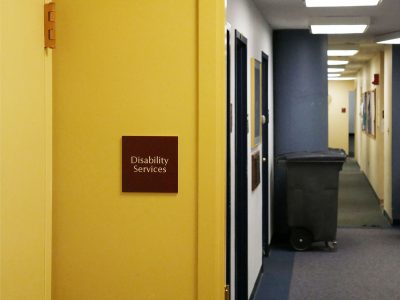
Boston University President Robert Brown announced all classes and examinations for the rest of the Spring semester will be held remotely amid the coronavirus pandemic in an email to the BU community March 17. As a result, the university is also handling all requests for learning accommodations virtually.
Lorre Wolf, director of Disability and Access Services at BU, said the organization was prepared in advance for the transition to remote learning and the changes associated with the switch.
“We already had a workflow for delivering accommodations remotely through our efforts with distance education and other such programs we already support,” Wolf said. “We began working with educational technologies immediately to develop training guidelines for faculty.”
Wolf said the current remote learning situation will not result in any changes in accommodations for students already registered with Disability and Access Services.
“All of our students who already had accommodations can expect to receive the same accommodation as appropriate for an online environment,” Wolf said.
New requests are being processed by the university, as per the procedure on their website, with room for flexibility.
“We have needed to be flexible because students can’t get to their doctors these days for ordinary things like filling out a form,” Wolf said.
Wolf said the transition has created a slew of challenges for many students, and that she and her colleagues are aware of this.
“A lot of students with various kinds of disabling conditions are having trouble being online all the time,” Wolf said. “Students with migraines, visual impairments, attention problems, organizational problems, and learning disabilities are experiencing trouble that range from headaches from screen glare to time management.”
Wolf said Disability and Access Services reached out proactively to more than a thousand students registered with them to offer them the help and resources they may need.
“A lot of students need encouragement to understand that they can still reach out to their professors, that professors are holding online office hours, that the Educational Resource Center is still operational,” Wolf said. “Many students who were struggling with headaches and glare were directed towards a piece of software called Read & Write Gold, which is a text to speech software.”
Wolf said that this period also requires creative thinking to deliver accommodations, as they deal with challenges, such as students not having textbooks or occasional computer malfunctions.
Katherine Robiadek, a faculty member for the College of Arts and Sciences’ Core Curriculum, said that her primary concern is making sure all her students continue to succeed and get the help they require, especially in regards to testing.
“As a faculty member, I am trying to understand how to accommodate students at the end of the term or the semester when testing starts for final exams,” Robiadek said. “That’s something that I anticipate dealing with requests for.”
Robiadek said she tries to keep the process of making accommodations as fair as possible, and usually receives these requests through the forms from Disability and Access Services that students are required to fill out.
“Sometimes students will approach me and divulge a need for accommodation, and then the process is to follow up with a form that’s provided through the university,” Robiadek said, “in order to make sure that we’re all on the same page to support students as much as possible.”
Despite her attempt to keep classes and assignments as normal as possible, Robiadek said she recognizes the issues students will be facing at this time. She said that many faculty members will encounter challenges, too.
“I realize on the student’s end, there might be technical issues in terms of reaching out and going through processes because of distance,” she said. “On the staff’s end, there are considerations in terms of access potentially to the office and things like that.”
However, Robiadek said she doesn’t believe the shift to remote learning will significantly hamper the process of making accommodations for students and helping them succeed.
“We’re the same people, just using a different platform,” she said.


























































































































